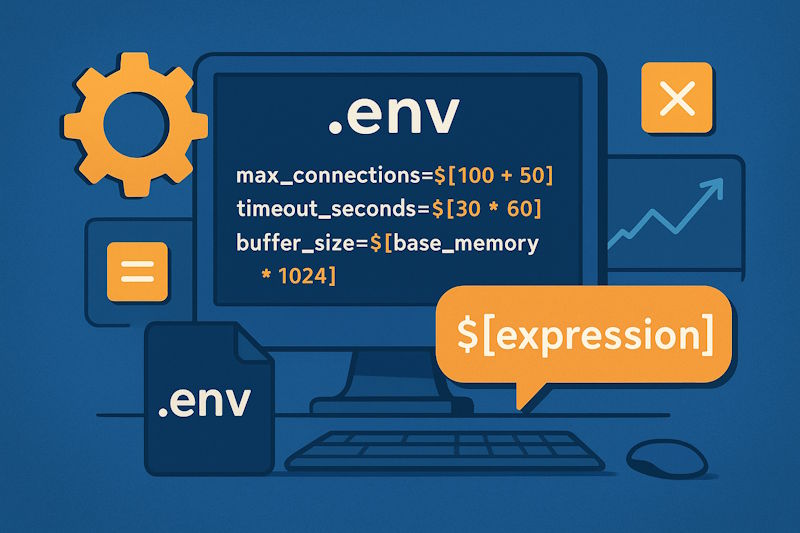The Evolution of the dotEnv System in DMVCFramework: New Dynamic Expression Support
Introduction
The dotEnv system has rapidly established itself as the standard for configuration management in modern applications. DMVCFramework adopted this methodology about 2 years ago, receiving very positive feedback from the Delphi community. With the introduction of support for dynamic expressions through the $[expression] syntax, the framework adds a new dimension to configuration management.
Adoption of the dotEnv System in the Delphi Community
Support for .env files in DMVCFramework has significantly simplified configuration management compared to traditional INI files, registry, or XML. The KEY=VALUE format and the simplicity of the dotEnv.Env('DATABASE_URL') call have made this solution immediately popular.

Main Advantages
- Code-configuration separation: Configurations separated from source code
- Security: Easy exclusion from version control systems
- Simplicity: Direct modification through text files
- Hierarchical configuration: Management of multiple
.envfiles with priorities (.env,.env.production,.env.local) similar to Linux/systemd systems
The Problem of Static Values
The traditional dotEnv system, while effective, is limited to static values. Often configurations require dynamic calculations, string concatenations, or conditional logic, forcing developers to handle these aspects in application code.
The Solution: Integrated Expression Parser
DMVCFramework now introduces an expression parser based on ExprEvaluator that supports the $[expression] syntax directly in .env files. The parser handles mathematical, logical, and string manipulation operations while maintaining high performance and security.
The expression evaluator used is available as a separate project on GitHub, allowing its use in other contexts beyond DMVCFramework.
Key Features:
- Total backward compatibility
- Efficient expression evaluation
- Controlled execution environment
- Future integration in other framework parts
📋 Basic Examples
The new system supports different types of expressions:
🧮 Mathematical Operations
max_connections=$[100 + 50] # 150
timeout_seconds=$[30 * 60] # 1800
buffer_size=$[base_memory * 1024] # Uses existing variables
⚙️ Built-in Functions
port_str=$[ToString(dbport)] # Number → string conversion
sqrt_result=$[sqrt(16)] # Result: 4
🔍 Boolean Expressions
high_memory=$[base_memory > 512] # True/False
is_production=$[mode = "production"] # String comparisons
Real Use Cases and Practical Advantages
Multi-Environment Configurations
The expression system integrates with hierarchical .env file management:
# File .env (base)
environment=development
is_production=$[environment = "production"]
database_pool_size=$[if is_production then 20 else 5]
# File .env.production (override)
environment=production
# Expressions are automatically recalculated
Separation Between Base Values and Derived Configurations
Hierarchical configuration allows for an even more advanced strategy: separating manually modifiable values from automatically calculated ones:
# File .env.values (base values modifiable by hand)
environment=production
max_memory_mb=4096
cpu_cores=8
database_host=prod-db.company.com
database_name=myapp
# File .env.computed (automatically derived configurations)
is_production=$[environment = "production"]
worker_processes=$[cpu_cores * 2]
max_connections=$[max_memory_mb / 4]
connection_string=$[ToString("Server=" + database_host + ";Database=" + database_name + ";MaxPoolSize=" + ToString(max_connections))]
cache_size_mb=$[max_memory_mb / 8]
log_level=$[if is_production then "ERROR" else "DEBUG"]
This approach ensures that administrators can easily modify only the essential parameters, while all complex configurations are calculated automatically maintaining consistency and reducing errors.
Other Practical Examples
# Scalable configurations
worker_processes=$[cpu_cores * 2]
max_connections=$[available_memory / 10]
# Dynamic connection strings
connection_string=$[ToString('Server=' + db_host + ';Database=' + db_name)]
Advantages and Future Prospects
Immediate Benefits
- Error reduction: Interconnected configurations eliminate inconsistencies
- Maintainability: Changes to base values automatically update derivatives
- Simplified testing: Quick verification of modification impacts
🚀 Future Framework Integration
The expression parser will be gradually integrated into other parts of DMVCFramework to support dynamic templates, advanced routing, and more sophisticated middleware configurations.
💎 Premium Content on Patreon
Expression support in dotEnv is just the beginning. For advanced insights, complex examples, and enterprise use cases, exclusive content is available for subscribers at https://www.patreon.com/delphimvcframework
What You’ll Find on Patreon
- In-depth tutorials: Detailed guides with advanced expression examples
- Video implementations: Live development sessions and best practices
- Complete projects: Real applications that fully leverage the new features
- Early access: Previews of future parser integrations in other framework parts
- Direct support: Privileged channels for technical questions
Support through Patreon is fundamental for continuing the development of innovative features in DMVCFramework.
Conclusions
The new support for $[expression] expressions in DMVCFramework represents a natural evolution of the dotEnv system, maintaining ease of use while adding significant power and flexibility.
This functionality opens new possibilities for intelligent and interconnected configurations, reducing application code complexity and improving the maintainability of enterprise applications.
Future integration of the parser into other framework parts promises further innovations. To fully explore these potentials and access advanced guides, we invite you to support the continuous development of DMVCFramework through Patreon.
A detailed article with advanced examples, enterprise patterns, and complex use cases will be available for Patreon subscribers at https://www.patreon.com/delphimvcframework
Comments
comments powered by Disqus